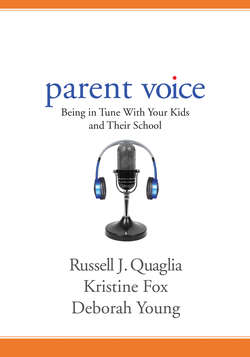Parent Voice

Реклама. ООО «ЛитРес», ИНН: 7719571260.
Оглавление
Russell J. Quaglia. Parent Voice
Praise for Parent Voice
Dedication
Parent Voice
Contents
Acknowledgments
About the Authors
Note from Dr. Q
Introduction Be the Parent You Want to Be . . . and the Parent YourChildren Deserve!
Chapter 1 Noise or Voice?
The New Language
The Responsibility of Voice
Reflect on Voice
Tuning Into Your Own Voice
Now Hear This!
Chapter 2 ListenHearing the Right Notes
Listening Matters
Keys to Effective Listening
Reflect—Respect
Reflect—Empathy
Reflect—Honesty
Reflect—Attitude
Reflect on Listening
Listening: Take Action
Instead of Asking General Questions, Try Being Specific
Instead of Inserting Advice, Try Being Open to Your Children’s Suggestions
Instead of Grilling for Answers, Try Discussing Ideas
Instead of Thinking “I Know Best,” Try Believing “We Know Best”
Instead of Forcing Conversations, Try Respecting Introspection
Instead of Forming Judgments, Try Trusting Your Child’s Perspective
4- to 7-Year-Olds. Seem to Have a Short Attention Span
Love Asking Questions
Misinterpret Body Language
Use Limited Vocabulary
8- to 10-Year-Olds. Direction Overload
Strong Sense of Right and Wrong
Argue Before Listening
Sensitive to Criticism
11- to 13-Year-Olds. Believe Parents Know Nothing (“You just don’t understand!”)
Fear Failure
Desire Independent Decision-making Opportunities
Increased Importance of Peer Group
14- to 18-Year-Olds. Friends’ Voices Have Increased Influence
Autonomy
Crave a Good Debate
Desire Space and To Be Left Alone
In Their Own Words: Advice on Listening, From Children to Parents
Nate, age 13
Thomas, age 11
The Three Ears to Success
Audrey, age 15
Listening for Life
Chapter 3 LearnGetting in Rhythm
Learning Matters
Mindful Learning
Learning and Interests
Speaking Their Language
Shared Adventures
Keys to Sincere Learning
Reflect—Acceptance
Reflect—Inquisitiveness
Reflect—Openness
Reflect—Patience
Reflect on Learning
Learning: Take Action
Instead of Knowing It All, Try Realizing No One Does!
Instead of Doing It Quickly Yourself,Try Slowing Down and Working Together
Instead of Completing Thoughts, Try Supporting Independent Thinking
Instead of Accepting the Status Quo, Try Moving Outside Your Comfort Zone
Instead of Worrying About Perfection, Try Focusing on Progress
Instead of Jumping to The Next Task, Try Reflecting
4- to 7-Year-Olds. Learn to Explain Themselves
Emerge as Readers
Look for Guidance
Learn From Siblings and Peers
8- to 10-Year Olds. Spend Significant Time on Electronics
Experience Self-consciousness
Share Ideas With Hesitation
Tune Out Others’ Ideas and Suggestions
11- to 13-Year-Olds. Desire Independence
Remain in Comfort Zone
Spend Time With Peers Instead of Parents
Overlook Connection Between Present Learning and Future Benefits
14- to 18-Year-Olds. Seek Separation From Parents
Think About the Future
Stress About School
Struggle With Motivation
Our Learning From Parents and Children
Never Stop Learning
Chapter 4 LeadWorking in Harmony With Your Child and School
Leading Matters
Digging Deeper
Developing Partnerships
Shared Goals
Keys to Leading Successfully
Reflect—Prioritize
Reflect—Teamwork
Reflect—Decision Making
Reflect—Responsibility
Proactive Voice at School
Reflect on Leading
Leading: Take Action
Instead of Listening to Just One Side, Try Understanding Different Viewpoints
instead of Responding to It, Try Sitting With It
Instead of Focusing on an Individual Piece, Try Seeing the Whole Puzzle
Instead of Being General, Try Being Specific
Instead of Running to the Rescue, Try Letting It Unfold
4- to 7-Year-Olds. Enjoy Parental Attention and Time
Focus on Life at Home
Struggle With Issues of Fairness at School
Enjoy Learning at School, but Not Interested in Reading at Home
8- to 10-Year-Olds. Progress to Structured Play With Peers
Begin To Be Aware of Community and World Issues
Blame Others; Don’t Take Responsibility for Actions
Want To Be Correct and Never Fail
11- to 13-Year-Olds. Feel Leading With Parents is Not Cool
Realize That Their Parents Do Not Know Everything
See Socializing as a Priority
Fail to Recognize Long-term Consequences
14- to 18-Year-Olds. Seek Parental Advice on Broad Range of Issues and Challenges
Develop Greater Awareness of Inequalities and Injustices
Act as Self-advocate
Feel Overloaded by Major Decisions
Our Learning About Leading
We Are All in This Together
Chapter 5 Staying in Tune With Your Child and School
Accept and Respect the Fact That Your Children Have Different Perspectives Than You
Parents Need and Deserve a Meaningful Role in School
Parenting Should Be a Priority, All the Time
Be Intentional
Be Yourself
Index
Отрывок из книги
Parents often struggle to find the right way to use their own voice in supporting, nurturing, and advocating for their children at home and at school. This book provides important wisdom from experienced educators that incorporates deep knowledge of children’s needs and development to help parents listen to their children, learn from them, and lead them toward becoming self-reliant adults.
—Gerald Aungst, K–4 Gifted Teacher Cheltenham Elementary School Cheltenham, PA
.....
Lesson Learned: Use your voice to challenge preconceived ideas of voice. Celebrate quiet, introverted children and the different ways they express their voices.
Dad’s Deliberations on Voice
.....